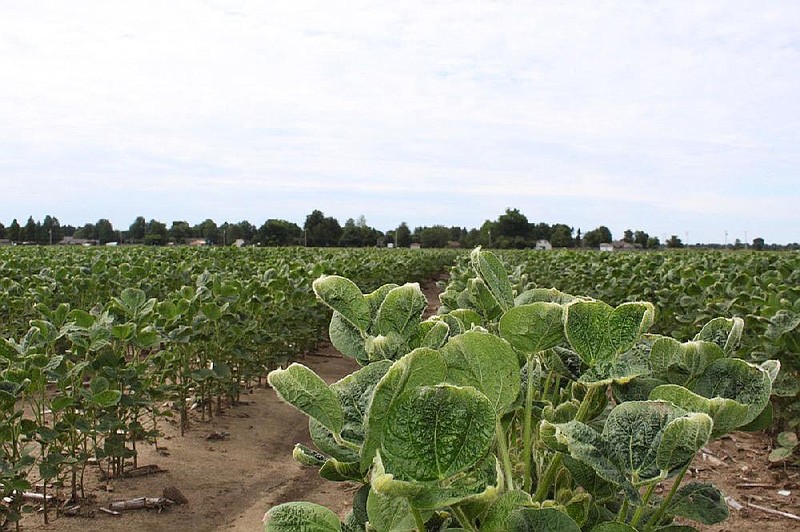The state Plant Board on Wednesday voted to loosen dicamba regulations for this crop season, scrapping a cutoff date on spraying the herbicide and removing buffer protections for specialty crops and crop-research facilities.
The board's 8-7 vote to adopt dicamba regulations put out last fall by the U.S. Environmental Protection Agency removes restrictions that the board set in December.
States are allowed to make pesticide laws more strict, but not looser, than federal regulations. Arkansas since 2017 has placed tighter restrictions on the herbicide linked to complaints of crop damage across the state.
The board's meeting and vote Wednesday were prompted by the filing of a "petition for rulemaking," or request to reconsider the restrictions approved in December. By law, the board is required to consider such petitions.
Such a meeting likely would have attracted enough farmers and others to fill the board's usual meeting room at the state Department of Agriculture. That room holds about 90 people, but because of the coronavirus pandemic, the meeting was held online.
Tyler Hydrick, a Jonesboro crop consultant, argued in his petition that dicamba formulations licensed by the EPA for use this summer are safer than previous in-crop formulations. In particular, he noted, dicamba manufacturers that received EPA approval last fall had taken steps to make dicamba less susceptible to off-target movement.
In December, the board set a May 25 cutoff date on spraying dicamba formulations that have been licensed for "in-crop" use, or after plants have emerged. The new federal "label" sets cutoff dates of June 30 for dicamba-tolerant soybeans and July 30 for dicamba-tolerant cotton.
Many Arkansas farmers who plant dicamba-tolerant crops have long wanted to spray the herbicide deeper into the summer, primarily to fight "super weeds" that have grown resistant to other herbicides.
Critics say summer heat makes dicamba even more volatile and a bigger threat to other vegetation, including backyard gardens and crops that are not dicamba tolerant.
Besides the May 25 cutoff, the board in December set a 1-mile buffer between dicamba-applied fields and agriculture research stations and commercially grown specialty and organic crops. It also set a half-mile buffer for soybean and cotton varieties that are not dicamba tolerant. The EPA's buffers range from 240 feet to 310 feet.
Research fields operated by the University of Arkansas' Agriculture Division have been hit by dicamba, with and without buffer protections, over the years.
In arguing in favor of loosening restrictions, Hydrick cited a "learning curve" for farmers, resulting in a gradual decrease in complaints of dicamba damage. He also said the Plant Board has unfairly targeted dicamba since 2017, such as by allowing field inspectors to initiate dicamba investigations and by increasing fines to as much as $25,000 per violation.
Matthew Marsh, a Plant Board member, responded that dicamba complaints have remained steady the past three years -- at about 200 each year. He also said illegal use of dicamba has been a focus of the board because dicamba has caused more problems since 2016 than other pesticides.
The board received more than 1,000 complaints in 2017, prompting a midseason emergency ban that year.
Marsh also said, contrary to some farmers' statements, they do have herbicide options besides dicamba deep into the summer. Marsh said the May 25 cutoff served as a "good" date, serving as a compromise among dicamba factions.
The vote Wednesday also removes a state regulation against mixing dicamba and glyphosate in spray tanks. State weed scientists have testified that such a mix makes dicamba more volatile and more likely to move off target to susceptible crops.
Monsanto, now owned by Bayer, developed the dicamba-tolerant seeds and put them on the market in 2015 (cotton) and 2016 (soybeans) and sued the Plant Board because of the restrictions. Bayer has continued the legal fight, now pending in the Arkansas Supreme Court.
The board's vote Wednesday, however, doesn't necessarily settle the matter.
Its decision to change the regulations moves the issue to Gov. Asa Hutchinson. If he agrees with Wednesday's decision, the matter is opened to public comment for 30 days. If more than 12 comments are received, the matter goes to a public hearing. Any changes also would require legislative approval.
Those steps are required by the state Administrative Procedure Act for boards and commissions, moving any final Plant Board decision deeper into the growing season for farmers and possibly complicating their planting and spraying schedules.
Plant Board members who voted to change the December regulations were: Kyle Baltz; Marty Eaton; Darrell Hess; Brad Koen; Reynold Meyer; Terry Stephenson; Sam Stuckey, and Barry Walls.
Voting against the change were: Bruce Alford; Tommy Anderson; Mark Hopper; Marsh; Scott Milburn; Mark Morgan, and Jason Parks.
Terry Fuller, a board member who has been against expanding dicamba's use into the summer, is now chairman and didn't vote.
The board's bylaws, Fuller said later by telephone, are unclear as to whether he is restricted to voting only to break a tie. "I thought it best to just let the board decide to take it to rule-making, to the public-comment period, to the public hearing and all that," Fuller said.
The December restrictions also were decided on an 8-7 vote.
The board has 16 members with voting privileges. Seven members are appointed by the governor; nine are selected by various agriculture trade groups.
